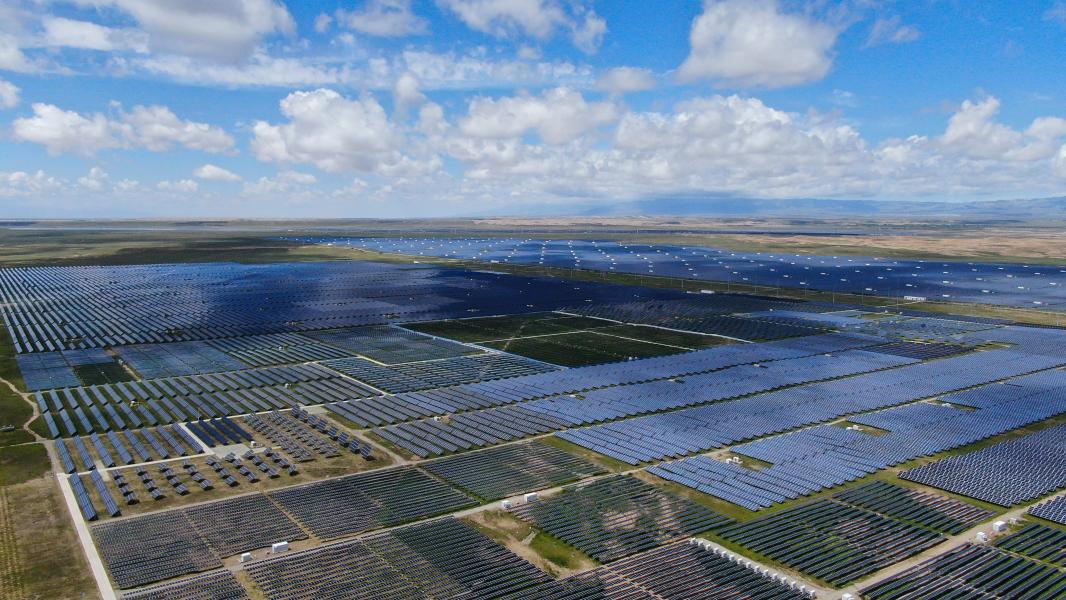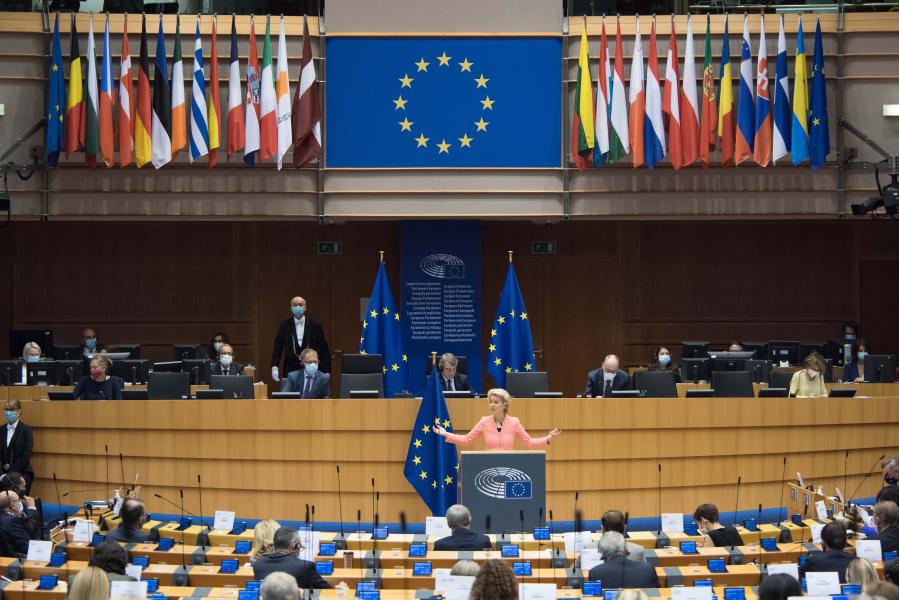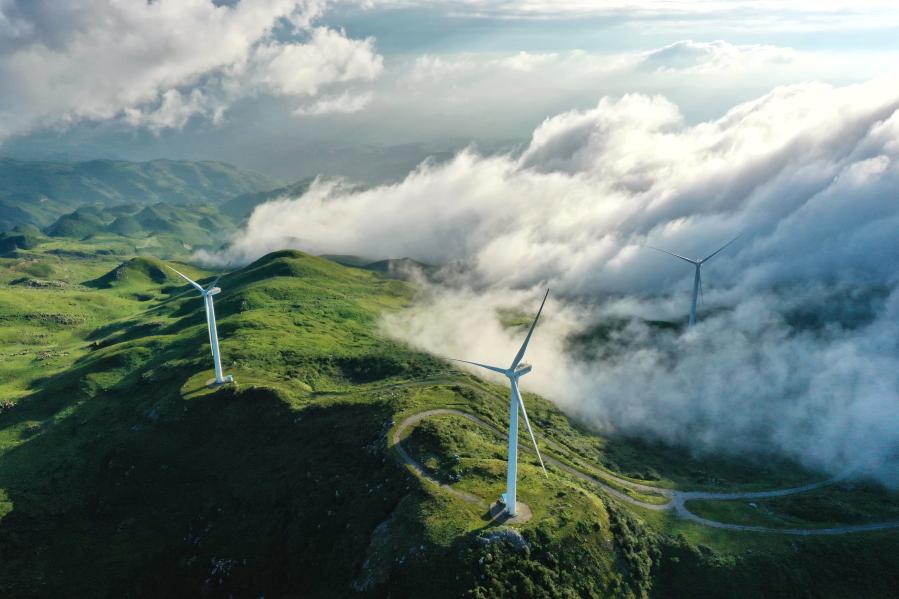China-Europe climate efforts pave way for world's "green recovery"
China and European countries are leading a "green recovery," making contributions to emissions reduction while finding more opportunities for green cooperation, experts have said.
Climate change has wreaked havoc on the world, whose damage is no less severe than the raging COVID-19 pandemic, recent reports have shown.
Over 11,000 disasters have been attributed to weather, climate and water-related hazards in the past 50 years, inflicting 2 million deaths and 3.6 trillion U.S. dollars in economic losses, according to the 2020 State of Climate Services report released earlier this month.
The report by 16 international agencies and financing institutions noted that extreme weather and climate events have increased in frequency, intensity and severity as a result of climate change and hit vulnerable communities disproportionately hard.
Mass loss from the Greenland Ice Sheet is predicted to be higher in this century than any time in the past 12,000 years, according to a study published last month in the science journal Nature.

Aerial photo taken on Aug. 17, 2020 shows a photovoltaic power station at the green industrial development park in the Tibetan Autonomous Prefecture of Hainan, northwest China's Qinghai Province. (Xinhua/Zhang Long)
Facing the stern challenge posed by climate change, China and European countries are making efforts to cut emissions and cooperate further on green development.
CHINA'S CLIMATE EFFORTS
China aims to have CO2 emissions peak before 2030 and achieve carbon neutrality before 2060, Chinese President Xi Jinping said at the General Debate of the 75th Session of the United Nations General Assembly via video on Sept. 22.
The announcement, experts said, has been significant, since global climate efforts direly need more contributions from major nations.
If China were to achieve its goal, it would lower global warming projections by around 0.2-0.3 degrees Celsius, said the Climate Action Tracker (CAT). The figure is the biggest single reduction the Berlin-based non-profit climate science and policy institute has ever estimated.
"This is the most important announcement on global climate policy in at least the last five years," which is "welcomed by many international climate policy observers," said Niklas Hohne of NewClimate Institute, one of CAT's two partner organizations.
"A large and influential nation like China committing to positive climate change goals can only be a good thing," Hannah Cloke, professor of hydrology at the University of Reading, said in an interview with Xinhua.
China's recent announcement is "a significant step in the fight against the global climate change," said Finn Mortensen, executive director of State of Green, a Copenhagen-based public-private partnership that promotes clean-tech solutions concerning climate change.
"At a time when the world is in the throes of the COVID-19 pandemic and multilateralism is being hampered, China's efforts on 'green recovery' and statement on carbon neutrality demonstrate its willingness to be open and cooperative," said professor Lei Xianzhang, a member of the German National Academy of Science and Engineering.

European Commission President Ursula von der Leyen delivers her first State of Union address to the European Parliament in Brussels, Belgium, Sept. 16, 2020. (European Union/Handout via Xinhua)
Meanwhile, European Union (EU) leaders have welcomed the target set by China, according to a statement issued during an EU special summit earlier this month.
The heads of state and government of the EU consider the move as "an important step in the right direction" following a video conference held by top officials of the EU and China on Sept. 14, said the statement.
On Sept. 30, German Chancellor Angela Merkel also said that encouraged by China's latest commitment to climate protection and emissions cuts, Europe will work with China in this field.
"When you see the development challenges the country still faces, these are very ambitious goals, which should also encourage us in Europe to really achieve our goals," said Merkel, referring to China's commitment to climate targets.
EUROPE'S ACTIONS
Earlier this month, the European Parliament approved amendments to the European Climate Law that envisions climate neutrality by 2050 as a binding goal for the EU.
After the voting, the parliament will need to start negotiations with the EU member states before a final version of the law is agreed on.
"With the EU also looking to increase its target, this (China's recent announcement of emissions target) is helping to ensure the world stays aligned to the goals of the Paris Agreement," Helen Clarkson, CEO of the international non-profit organization Climate Group, told Xinhua.

Aerial photo taken on Aug. 19, 2020 shows cloud-shrouded wind turbines in Jiucaiping scenic spot in southwest China's Guizhou Province. (Xinhua/Liu Xu)
Britain has also set a target to bring all greenhouse gas emissions to net zero by 2050, and has revealed plans that will see offshore wind produce more than enough electricity to power every home in the country by 2030, based on current electricity usage.
"Now, as we build back better, we must build back greener. So we are committing to new ambitious targets and investment into wind power to accelerate our progress towards net zero emissions by 2050," said British Prime Minister Boris Johnson in a recent statement.
GREEN COOPERATION
China has already made substantial progress in efforts to achieve its climate goals.
By the end of 2019, China's CO2 emissions per unit of the GDP were 48.1 percent less compared with those in 2005, and the share of non-fossil fuels reached 15.3 percent, achieving 2020 climate action targets ahead of schedule, according to Liu Youbin, spokesperson for China's Ministry of Ecology and Environment.
China's pilot carbon trading market had a total carbon emission trading quota of 406 million tons by the end of August, becoming the world's second-largest market, according to the ministry.
China is determined to work with other countries to build a fair, equitable, and win-win global climate governance system through cooperation, and to promote a full, effective, and sustained implementation of the Paris Agreement, said Liu.
"Perhaps the substantial investment that China will need to make in green businesses and solutions will also drive development of these things," said professor Cloke, whose research in hydrology and forecasting has helped the EU and British policymakers make better decisions about flood preparation.
China's efforts to reduce carbon emissions are boosting development in sectors such as renewable energy and electric vehicles (EVs), where companies from China and Europe have great opportunities for cooperation.

Photo taken on Sept. 23 shows a cloud rail train running in the campus of the headquarters of China's new-energy vehicle manufacturer BYD in Shenzhen, south China's Guangdong Province. (Xinhua/Mao Siqian)
China is on its way to become the biggest market for EVs again by the end of 2020, according to a market assessment published last month by the German Center for Automotive Research.
During the China-Germany Automobile Conference that took place this month, China's leading automaker First Automotive Works and German automaker Audi signed a memorandum of understanding on the establishment of a joint venture for production of electric vehicles based on the Premium Platform Electric platform.
"This decision emphasizes the strategic importance of the Chinese market. We are thus actively pushing forward with innovations locally," said Markus Duesmann, chairman of the Board of Management of Audi AG.
Furthermore, cooperation is not just happening in green mobility.
"The Belt and Road Initiative, or BRI, has become the world's largest platform for international cooperation. Green is the salient background of the BRI development roadmap," said Chinese Ambassador to Britain Liu Xiaoming at a recent event.
China and Britain have jointly issued the Green Investment Principles for the Belt and Road, and via the BRI platform, energy companies could expand bi-party, tri-party and multi-party cooperation in the areas of environmental protection, energy conservation, emissions reduction, infrastructure development, green finance and financial technology, according to Liu.
"If all countries are moving in the same direction it is going to be easier ... So we should always try and work together. And things like investing in green technologies, if we all do that together, we're going to bring the cost down for everybody," Cloke added.